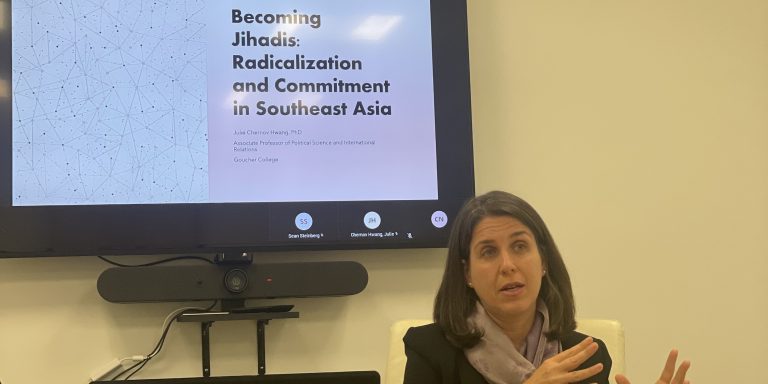On June 21, 2023, The Soufan Center hosted Professor Julie Chernov Hwang for a briefing and discussion on her new book, Becoming Jihadis: Radicalization and Commitment in Southeast Asia.
Becoming Jihadis examines the motivations, internal and external pathways, and processes in which individuals involve themselves with and join Islamist extremist groups, and the ways in which they show their commitment and conduct activities for these groups. Professor Hwang identified some of the key motives and pathways as internal or external. Internal pathways include familial ties and kinship, with individuals having family members involved with terrorist organizations or attending schools with extremist agendas. External pathways consist of outsiders making the decision to join these groups by being exposed to radical ideas in study sessions, areas of conflict, prisons, and social media to a lesser extent. Professor Hwang also explained the multifaceted circumstances occurring in an individual’s life, that make someone susceptible to, or desire to, joining an Islamist extremist group. These circumstances cause an individual to feel the need for either redemption, revenge, a jihad experience, or money. Her book shows how members of different extremist organizations with differing agendas still cooperate and share resources, illuminating how ideology functions as a binding agent, not a cause.
The discussion also highlighted several key lessons learned in terms of prevention and disengagement, the most important being the need to ensure that measures are tailored to local contexts. One program, for example, taught life skills like farming and duck husbandry to largely urban residents, who found little utility in the training offered. The need to ensure that the families of detainees are cared for by the state, rather than by violent extremist groups, was also highlighted. As the global terrorism landscape shifts to Africa, there was a discussion about the possibility of Southeast Asian foreign fighters “floating” around conflict zones in the Levant potentially making their way to Africa or South Asia. The need to continue to pay attention to Asia, including areas where there were legacies of inter-community violence, terrorism, and violent extremist movements, was underscored, even as global policymakers have downshifted attention to counterterrorism. These groups play a long game, it was noted.
Professor Julie Chernov Hwang is an Associate Professor in the Political Science and International Relations Department at Goucher College in Baltimore, Maryland. A specialist in Southeast Asian Islamist extremist groups, she describes the purpose of her research as “how and why individuals join and leave Islamist extremist groups.” Her newest book published in 2023, Becoming Jihadis, Radicalization and Commitment in Southeast Asia, serves as a prequel to her 2019 book, Why Terrorists Quit: The Disengagement of Indonesian Jihadists. In order to compile the research for her book, Professor Hwang made over 12 trips to Southeast Asia beginning in 2012, conducting over 150 interviews of 97 jihadis from 14 extremist groups in Indonesia. She conducted an additional 25 interviews of jihadis from the Philippines in 2019.Through her research, she gained insight into the strong social and emotional bonds required for individuals to join, commit criminal acts for, and trust one another within an Islamist extremist group.
